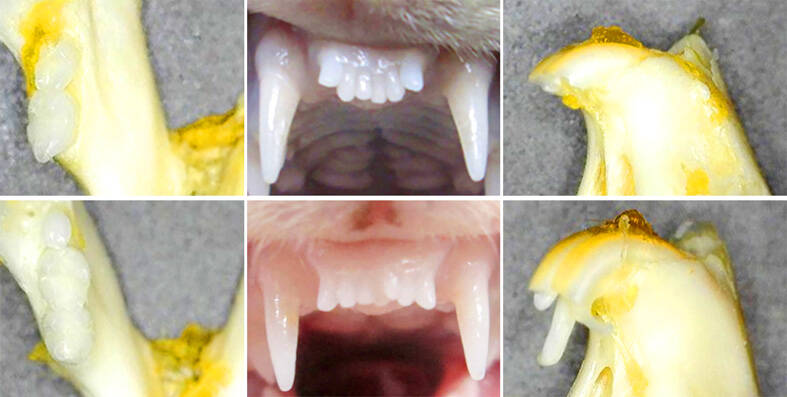People with missing teeth might be able to grow new ones, said Japanese dentists, who are testing a pioneering drug they hope will offer an alternative to dentures and implants.
Unlike reptiles and fish, which usually replace their fangs on a regular basis, it is widely accepted that humans and most other mammals only grow two sets of teeth.
However, hidden underneath our gums are the dormant buds of a third generation, said Katsu Takahashi, head of oral surgery at the Medical Research Institute Kitano Hospital in Osaka, Japan.

Photo: AFP / Medical Research Institute Kitano Hospital
His team launched clinical trials at Kyoto University Hospital in October, administering an experimental medicine to adult test subjects that they say has the potential to jumpstart the growth of the concealed teeth.
It’s a technology “completely new” to the world, Takahashi told reporters.
Prosthetic treatments used for teeth lost to decay, disease or injury are often seen as costly and invasive.
So “restoring natural teeth definitely has its advantages,” said Takahashi, the project’s lead researcher.
Tests on mice and ferrets suggest that blocking a protein called USAG-1 can awaken the third set and the researchers have published lab photographs of regrown animal teeth.
In a study published last year, the team said that its “antibody treatment in mice is effective for tooth regeneration and can be a breakthrough in treating tooth anomalies in humans.”
For now, the dentists are prioritizing the “dire” needs of people with six or more permanent teeth missing from birth.
The hereditary condition is said to affect about 0.1 percent of people, who can have severe trouble chewing, and in Japan often spend most of their adolescence wearing a mask to hide the wide gaps in their mouth, Takahashi said.
“This drug could be a game-changer for them,” he added.
The drug is aimed primarily at children and the researchers want to make it available as early as 2030.
Angray Kang, a dentistry professor at Queen Mary University of London, only knows of one other team pursuing a similar objective of using antibodies to regrow or repair teeth.
“I would say that the Takahashi group is leading the way,” said the immunotechnology expert, who is not connected to the Japanese research.
Takahashi’s work is “exciting and worth pursuing,” Kang said, in part because an antibody drug that targets a protein nearly identical to USAG-1 is already being used to treat osteoporosis.
“The race to regenerate human teeth is not a short sprint, but by analogy a set of back-to-back consecutive ultra-marathons,” he said, adding: “This is only the beginning.”
No young people with the congenital disorder are taking part in the first clinical trial, as the main objective is to test the drug’s safety, rather than its effectiveness.
So for now, the participants are healthy adults who have lost at least one tooth.
And while tooth regeneration is not the express goal of the trial this time around, there is a slim chance that it could happen to subjects anyway, Takahashi said.
If so, the researchers will have confirmed that the drug can be effective for those with acquired toothlessness — which would be a medical triumph.
“I would be over the moon if that happens,” Takahashi said.

Kehinde Sanni spends his days smoothing out dents and repainting scratched bumpers in a modest autobody shop in Lagos. He has never left Nigeria, yet he speaks glowingly of Burkina Faso military leader Ibrahim Traore. “Nigeria needs someone like Ibrahim Traore of Burkina Faso. He is doing well for his country,” Sanni said. His admiration is shaped by a steady stream of viral videos, memes and social media posts — many misleading or outright false — portraying Traore as a fearless reformer who defied Western powers and reclaimed his country’s dignity. The Burkinabe strongman swept into power following a coup in September 2022

A new online voting system aimed at boosting turnout among the Philippines’ millions of overseas workers ahead of Monday’s mid-term elections has been marked by confusion and fears of disenfranchisement. Thousands of overseas Filipino workers have already cast their ballots in the race dominated by a bitter feud between President Ferdinand Marcos Jr and his impeached vice president, Sara Duterte. While official turnout figures are not yet publicly available, data from the Philippine Commission on Elections (COMELEC) showed that at least 134,000 of the 1.22 million registered overseas voters have signed up for the new online system, which opened on April 13. However,

‘FRAGMENTING’: British politics have for a long time been dominated by the Labor Party and the Tories, but polls suggest that Reform now poses a significant challenge Hard-right upstarts Reform UK snatched a parliamentary seat from British Prime Minister Keir Starmer’s Labor Party yesterday in local elections that dealt a blow to the UK’s two establishment parties. Reform, led by anti-immigrant firebrand Nigel Farage, won the by-election in Runcorn and Helsby in northwest England by just six votes, as it picked up gains in other localities, including one mayoralty. The group’s strong showing continues momentum it built up at last year’s general election and appears to confirm a trend that the UK is entering an era of multi-party politics. “For the movement, for the party it’s a very, very big

ENTERTAINMENT: Rio officials have a history of organizing massive concerts on Copacabana Beach, with Madonna’s show drawing about 1.6 million fans last year Lady Gaga on Saturday night gave a free concert in front of 2 million fans who poured onto Copacabana Beach in Rio de Janeiro for the biggest show of her career. “Tonight, we’re making history... Thank you for making history with me,” Lady Gaga told a screaming crowd. The Mother Monster, as she is known, started the show at about 10:10pm local time with her 2011 song Bloody Mary. Cries of joy rose from the tightly packed fans who sang and danced shoulder-to-shoulder on the vast stretch of sand. Concert organizers said 2.1 million people attended the show. Lady Gaga